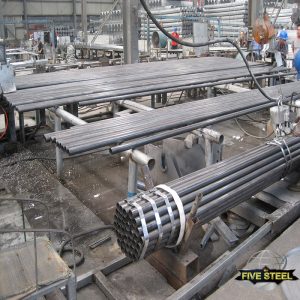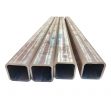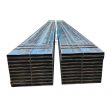Enhance the steel industry’s ability for sustainable development
The steel industry, as a key player in global economic growth, has a responsibility to embrace sustainable practices and contribute to a greener future. With the increasing focus on environmental conservation and the urgency to combat climate change, it is crucial for the steel industry to enhance its ability for sustainable development of welded steel pipe. By adopting innovative technologies, promoting circular economy principles, and prioritizing energy efficiency, the steel industry can reduce its environmental impact while maintaining economic viability.

One of the primary areas of improvement lies in the adoption of cleaner production technologies. Traditional steel production processes, such as the blast furnace route, are energy-intensive and emit substantial amounts of greenhouse gases, contributing to climate change. However, advancements in technology have led to the development of greener alternatives, such as electric arc furnaces (EAF) and direct reduction processes. EAFs utilize scrap steel and renewable energy sources, significantly reducing carbon emissions. Direct reduction processes, on the other hand, eliminate the need for coke, resulting in lower greenhouse gas emissions. By investing in and embracing these cleaner production technologies of hot rolled steel pipe, the steel industry can minimize its environmental footprint and contribute to sustainable development.
Another crucial aspect of enhancing the steel industry’s sustainability is the promotion of circular economy principles. Steel is highly recyclable, and recycling rates have been steadily increasing. However, there is still room for improvement. Encouraging the use of recycled steel and implementing efficient recycling systems can help reduce the industry’s reliance on virgin raw materials, conserve energy, and minimize waste generation. Additionally, incorporating life cycle assessments into product design and manufacturing processes can ensure that steel products like structural steel pipe are produced, used, and disposed of in the most sustainable manner.
Energy efficiency is a vital component of sustainable steel production. The industry is a significant energy consumer, and optimizing energy usage can result in substantial environmental and economic benefits. Implementing energy management systems, investing in energy-efficient technologies, and adopting energy-saving practices throughout the production process can significantly reduce the steel industry’s carbon footprint. Furthermore, the utilization of renewable energy sources, such as solar and wind power, can further enhance the industry’s sustainability by reducing reliance on fossil fuels.
Collaboration and knowledge sharing are key in driving sustainable development within the steel industry. Industry stakeholders, including steel producers, researchers, policymakers, and environmental organizations, should work together to exchange best practices, share technological advancements, and develop common sustainability standards. By fostering collaboration and creating platforms for dialogue, the steel pipe supplier can accelerate its transition towards sustainable practices and overcome challenges more effectively.
Tel: +86 18202256900 Email: steel@tjdpbd.com









